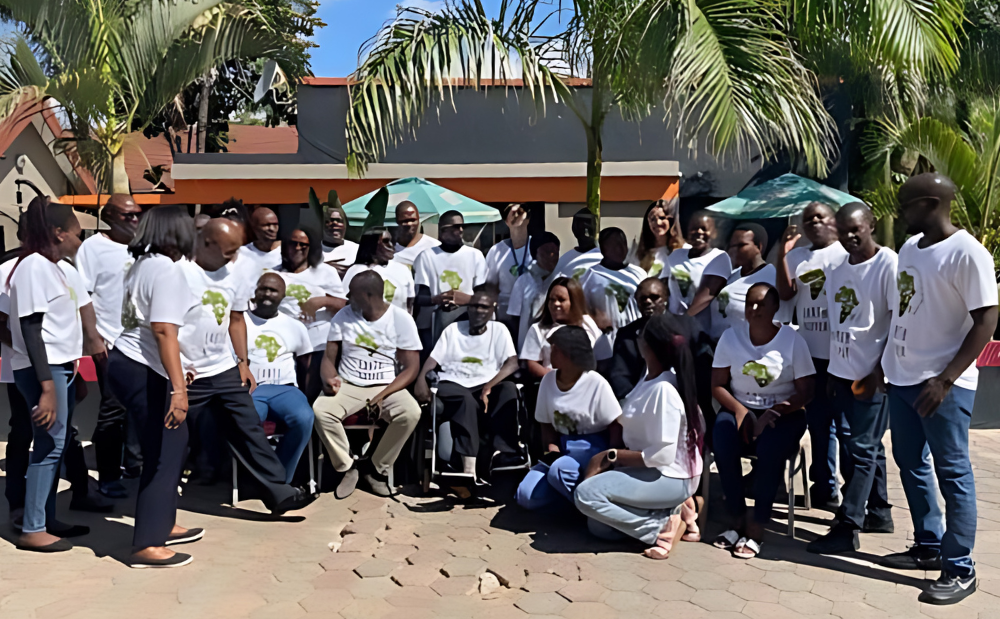SAFCEI hosts FLEAT Zambia follow-up workshop
- Published:

We hosted a FLEAT follow-up workshop for FLEA Zambia I and II cohorts at Nomad’s Court Lodge in Lusaka from 7 to 9 May 2024, with 26 faith leaders (12 Women and 14 Men) from all provinces in Zambia. It also served as a platform to strengthen relationships between SAFCEI, the Zambia Alliance for Agroecology and Biodiversity (ZAAB) and PELUM Zambia.
A communique team of five people captured the key messages from the event that will be communicated nationally and will also contribute to the regional message to the United Nations Framework for Convention of Climate Change (UNFCCC)’ s Conference of Parties (COP) 29 in Baku, Azerbaijan. The communique was finalised on the third day and shared with the group for their input and adoption.
Ngonidzashe Edwards, from the Jesuit Centre for Ecology and Development (JCED) Malawi, shared his work in ecological restoration, integrating creative art, spirituality, and the natural environment, telling the story of earth’s evolution in a way that inspires action for those most affected by climate change. He infused the element of eco-spirituality into our learning space.
The participants also engaged in appreciative inquiry, sharing change stories and inspirational eco-justice ideas and experiences, such as tree planting to address deforestation, seed preservation, and engaging local leaders and also farmers to adopt environmentally friendly production methods, and advocacy work focused on engaging local chiefs and local government officials.
Joseph Mwitumwa from the Community Technology Development Trust presented on the importance of Farmer Managed Seed Systems (FMSS). The process is farmer-centred, supporting locally adapted seed conservation and usage for improved food security. It empowers farmers with greater autonomy and restores land with the minimal use of chemicals. He added that genetic diversity is enhanced and there is a lower input cost. Strategies to support FMSS include policy advocacy, capacity building, seed exchange networks, research, and innovation.
Richard Worthington-Smith gave an overview of the impact of climate and energy policies in Zambia and their effect on sustainable development. Science agrees with the work that the faith leaders are already doing in terms of responding to the climate crises. Zambia is a net exporter of electricity, so the faith leaders questioned the rolling load shedding that continues to affect communities. Contractual commitments demand that they export even when there is not enough power for domestic use. This issue was discussed at length.
Concerns were raised about the policy and implementation gap. The faith leaders noted that the situation on the ground is very difficult for ordinary people and that government agencies do not implement the law to serve the communities but rather their economic agendas.
Zwelisha Shobede from SAFCEI shared information about the campaign against the caging of egg-laying hens, with free-range egg production advocated as the preferred method. Gabriel Manyangadze presented on agroecology principles and the five levels of agroecology. The key messages were: stop using pesticides as hazardous chemicals will find a way to get back to us (our system), change your farm - change impact on the surroundings, change to markets and whole systems change - to enable the whole ecosystem to prosper.
Melissa Juisi from the West Africa Civil Society Institute (WACSI) presented the advocacy strategies, emphasising that it has to be advocacy focused on change, targeting specific policy influences. For every problem, there is a policy issue, context analysis, strategising, planning and messaging. She further explained how tools like stakeholder analysis, allies and opponents matrix, participation ladder, and power triangle can be used to shape the advocacy process.
Glynis Goyns presented on Publicity with Transformative Power, noting that stories are the fabric of life and every story is unique. Stories told to the right people at the right time will generate other stories. When these are put together, they can change the world. Francesca de Gasparis presented on the skills required for an elevator pitch. One creative faith leader, Rev Karen Mwenda, did a pitch challenging SAFCEI on the nature of food consumption, advocating food for good nutrition and health. Finally, Elvis from Zambia Adolteens Sustainable Health Organisation presented on their work with farmers in the Southern Province and their collaboration with ZAAB.
On eco-footprinting, most people realise that they are leaving a heavy footprint on the environment in their day-to-day lives. Faith leaders indicated that they will want to do the eco-footprinting exercises using the eco-footprinting manual adapted to the Zambian context.
The faith leaders committed to advocate and add their voices to energy and climate justice. As people of faith, it is not necessary to know all the technical facts, but to stand on moral and lived experience, rooted in the realities at a local level. Faith leaders must rally for policy and practice to come together in a way that is most relevant and impactful. This is because the voice of faith has been faint in the climate debate at local and national levels and needs to be amplified and authentically represented at regional and international forum
Who we are

SAFCEI (Southern African Faith Communities’ Environment Institute) is a multi-faith organisation committed to supporting faith leaders and their communities in Southern Africa to increase awareness, understanding and action on eco-justice, sustainable living and climate change.
Featured Articles
-

South Africa: Who Ends Up Paying If DMRE Cooks the Price of Nuclear Power?
-

South Africa’s nuclear energy expansion plans continue to draw criticism, environmental NGOs chew over legal challenge
-

Earthlife Africa and SAFCEI respond to latest unsettling nuclear news regarding the ministerial determination
-

Open Wing Alliance Africa (Virtual) Summit 2023
-

The Green Connection and SAFCEI respond to energy minister's divisive and deflecting comments
-

Job Vacancy: FLEAT Coordinator







